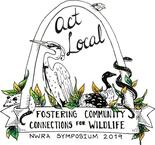Mammals I Abstracts
|
Full Abstract
This lectures highlights lessons learned from over-wintering eight juvenile southern flying squirrels and includes post-release observations. |
Cottontails: Commonly Admitted, Uncommonly Complicated!
Karen McKenzie, Fellow Mortals Wildlife Hospital Watch Video (Login required) Full Abstract
Cottontails! One of the hardest to rehabilitate, yet for many, the most common species admitted for rehabilitation. This interactive session needs you! Please come willing to share your experiences and learn from each other. Discussion follows a loose session plan to ensure we can cover the topics most important to cottontail rehabilitation, including nutrition (formula choices, weaning diets, probiotics and other supplements, feeding techniques); diarrhea (causes, prevention, treatments); and special considerations of neonates. |
Cost Efficient Enclosure to Enhance Behaviour & Welfare of Red Foxes
Cale Matesic, University of Guelph Watch Video (Login required) Full Abstract
Design, construction, and testing of a new enclosure to enhance behaviour and welfare of red foxes were conducted in the winter, spring, and summer of 2017. Four red foxes were chosen in the testing of the enclosure to see its effectiveness. Analysis of structural materials was conducted and decided upon based off of price, properties, ease of acquiring, and safety for the animals. Structural integrity showed no signs of weakness and the foxes had no dependency on humans. The analysis suggests that further testing is required in order to cement the findings presented as each set of foxes are different. |
|
Captive Rearing & Rehabilitation of North American Foxes
Lisa Fosco, Walden's Puddle, Wildlife Center of Greater Nashville Watch Video (Login required) Full Abstract
Fox kits are very commonly admitted to wildlife rehabilitators in North America. This presentation discusses successful methods for rearing them in captive care. Natural behavioral development is emphasized as this is critical for post-release survival in these species. Topics include neonatal concerns, diet and feeding, housing, husbandry, medical considerations, and release criteria. |
Wild Fostering Endangered Mexican Gray Wolves
Regina Mossotti, Kim Rutledge, Endangered Wolf Center, Wildlife Rescue Center Pending Publishing Permission Full Abstract
Presenters discuss cross-fostering (wild fostering) of critically endangered, captive-born wolves. The focus includes the partnership between Endangered Wolf Center and Missouri Wildlife Rescue Center and the logistics involved in transporting four critically endangered, 10-day old wolf pups from St. Louis to wild Mexican wolf packs in New Mexico and Arizona in the first ever double foster. |

